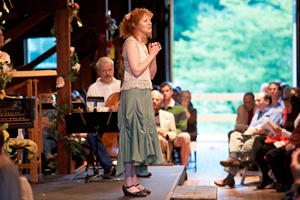by Mike Telin and Daniel Hautzinger

Beginning on Thursday, June 12, and continuing through Sunday, June 22, at venues throughout the area (see our concert listings page for times and locations), Apollo’s Fire will present “Glory on the Mountain: An Appalachian Journey.” The concerts will feature the mixture of fiddle tunes, ballads, shape-note hymns, and spirituals that typify Appalachian music. (An extra performance on Saturday, June 14 at 3:00 pm has just been announced.)
“With ‘Come to the River’ I spent two years researching fiddle tunes and ballads from Appalachia and it was a wonderful introduction into that repertoire. I had heard some lovely ballads when I was in the Shenandoah Valley as a teenager, but it was not the music that I was performing and studying as my profession,” Sorrell recalled. After five years of playing Appalachian music and thinking about what the next program would be, Sorrell wanted to develop a program that would highlight the Celtic roots of the music, which the settlers brought with them from Ireland and Scotland. But she was surprised to discover that the Appalachian versions were often much darker than the originals. “I wanted to do something that tries to get more to the roots of this darkness within the psyche, which really comes through in the folk tales,” Sorrell said.
One of those folk tales, a ballad called Two Sisters, illustrates a typical hurdle in performing these songs. “There are twenty-six versions of the text and at least four versions of tunes that have been associated with this ballad. My task has been to choose which versions of the text and which versions of the tunes to include. I’m using three different tunes in that ballad because it’s a fairly long story. Parts of it are lower and dramatic, while other parts are more excited and agitated.”
Why does Sorrell think the texts are so dark? “The settlers who came here, for the most part, were the ones who were very unhappy in England, Scotland and Ireland, either for reasons of poverty, political reasons, or religious persecution. To pick up your life and move across the ocean to a completely unknown place takes a certain type of person. When they arrived, life was hard, but they had complete freedom. On the other hand there were long cold winters and little if any infrastructure. That’s my guess. I think it’s something which our audiences can ponder for themselves while hearing some of these stories.”
With so many great tunes to choose from, Sorrell laughed when saying that her hardest task was the process of “kicking pieces off the island. I’ve been painfully crossing things out, but it’s so hard because I love all of them.” Sorrell has constructed her program in a series of thematic sets such as “Crossing to the New World,” “Dark Mountain Home,” and “The True Lover.”
“The last set in the first half is called “Corn-shuck Party, she said.” It opens with a little improvised story-telling, which our tenor Ross Hauck is so wonderful at doing.” The final set, “Glory on the Mountain,” includes Oh Mary, Don’t You Leave, which features soprano Amanda Powell. “There is a final piece, for which I have written the words. It’s a reprise of the Scottish song we opened the concert with, but the new words are about being at home in Appalachia.”
Additional performers include Apollo’s Fire favorites Kathie Stewart, wooden flutes, Tina Bergmann, hammered dulcimer; Brian Kay, lute, guitar, and banjo; and René Schiffer, cello. Making her Apollo’s Fire debut is Susanna Perry Gilmore, fiddle. “I really wanted someone who had grown up playing fiddle music, but they had to have a classical background too. It’s a hilarious story.
“I was guest-conducting the Omaha Symphony, where Susanna is the concertmaster. We were rehearsing some Vivaldi solo concertos and I complimented her on her lovely Baroque style. She thanked me, saying, ‘maybe the reason I have a feeling for it is because I grew up playing fiddle music, and there’s a relationship between the two.’ It turns out that she lived in Nashville for a while in her youth, then moved to Oxford, England when she was seventeen. She spent five years studying musicology at Oxford, while playing Irish fiddle music with Irish musicians in the pubs.”
Sorrell also has experience performing this music in its traditional home. Her first job was playing piano for a small Southern Baptist church in the Shenandoah Valley. “I just love the harmonies and the style”, she said. “Glory on the Mountain” allows her to return to that love and share it with an audience.
Published on ClevelandClassical.com June 5, 2014.
Click here for a printable copy of this article.



